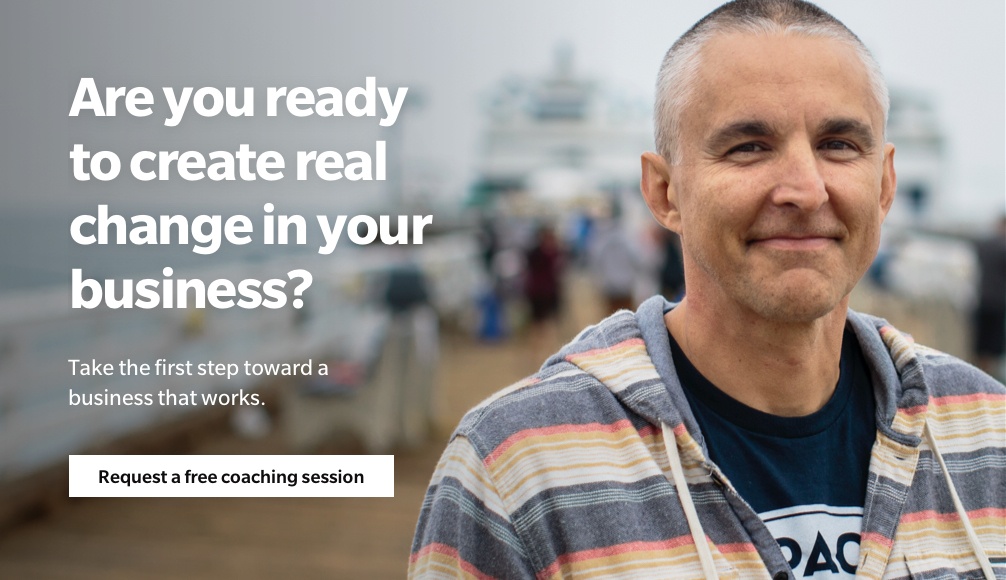When Michael E. Gerber released his best-selling book, The E-Myth Revisited: Why Most Small Businesses Don’t Work and What to Do About It in 1995, he described, in a deeply-relatable way, what makes it so difficult for business owners everywhere to build a business that really works. Through the story of Sarah, a baker struggling to keep up with her pie shop, Michael crafted a universal metaphor for the common misconceptions and pitfalls that can turn the hopes and dreams of small business owners into frustration and, too often, failure. The book offers a blueprint for “what to do about it”—how small business owners can pivot from working in their business to working on it, and start to produce the results they really want.
The time-tested perspective in The E-Myth Revisited has transformed millions of small businesses throughout the world, and still serves as our EMyth Coaches’ north star. Everyone on our team has a dog-eared copy close at hand so they can find that perfectly inspiring quote for a client who needs to hear what Michael has to say about their current dilemma—and say it better than just about anyone.
During this last year and a half, as we’ve seen so many small businesses struggle through the pandemic, the three core ideas introduced in the first chapter of the book feel more relevant than ever. So, even if you know them well, we’d like to share our take on these groundbreaking concepts: the E-Myth, the entrepreneurial seizure and the fatal assumption. As a business owner during this unusual time, we hope you’ll find new meaning in them so they can help you build your business in the coming year—and over its lifetime.
The E-Myth
The E-Myth stands for the Entrepreneurial Myth. It’s the myth that businesses are started by Entrepreneurs: people who risk capital for reward, and launch businesses with a clear and driving vision of how they can find a sweet spot in the market to identify and provide what consumers want. All we have to do is look to visionary icons like Bill Gates, Richard Branson, Steve Jobs and Jeff Bezos to easily understand how this myth has been perpetuated.
The reality is that most businesses are started by Technicians: people who’ve developed a technical craft working for someone else and have decided to strike out on their own. People who go into business with a Technician’s mindset are looking for a place to do what they love and what they’re good at, free from having to answer to a boss. Plumbers open plumbing businesses, chiropractors open chiropractic practices and chefs open restaurants. What’s driving them is the wish to be free to work at their craft exactly the way they want to.
While Technicians know a great deal about the technical work they do, they typically know very little about building a successful business—a reality that quickly overwhelms them.
The entrepreneurial seizure
In the past few years, we’ve seen a growing demographic of new business owners exploring entrepreneurship through books, business programs and online courses. Despite this trend, most businesses are still started by Technicians out of a sudden and powerful urge for the freedom to do their own thing, to do the work that’s calling them, to set their own hours and control their own destiny.
Michael calls this impulsive moment in which Technicians make the decision to leave employment—and their boss—behind an entrepreneurial seizure. The conversation with themselves goes something like this: Hey, I can have more time, more money, more freedom than I do now working for this joker if I go into business for myself!
The catapulting moment could be anything: Maybe they were passed up for a promotion, scheduled for another double shift, or frustrated with a supervisor who didn’t listen to them for the 100th time. Whatever the trigger, they grab on to it—they can’t not open the door of their own business once the impulse comes over them. And they dive right in…doing technical work.
This approach is very different from how someone with a true entrepreneurial mindset goes into business. And, that difference—between working on their business rather than just in it—changes everything about the owner’s experience, and the results they’re able to produce.
The fatal assumption
While the entrepreneurial seizure is the emotional impetus that moves a Technician to go into business for themselves, the fatal assumption is the reason behind it. This unchecked assumption goes like this: If I understand how to do the technical work of my business, I understand a business that does that technical work.
And nothing could be further from the truth. It’s like saying that someone with beautiful penmanship could write a great novel. They’re completely different things—different skills and types of work. Being exceptional at one doesn’t imply skill in the other. In the case of the Technician who goes into business under this assumption, it can be fatal because it’s the cause of so many business failures. Fifty percent of businesses close their doors within the first five years because their owners failed to realize—until it was too late—that their technical skill didn’t prepare them for the real demands of owning and operating a business. For the same reason, most of the business owners who make it through the first five years barely survive. Here’s how that happens.
As skilled craftspeople, it’s natural for Technicians to focus on doing what they do best, engaging in Technician’s or Tactical Work. So in starting a business, they quickly find themselves gravitating to the things they know how to do, while having no idea how to do so much of what the business needs: the skills of leadership, management, marketing, sales, finance and customer fulfillment. These skills are needed to build a business that not only survives, but thrives. And, therein lies the problem: Their fatal assumption fueled by their entrepreneurial seizure almost guarantees that they never considered all the ways they’d have to be equipped to build a business that really works.
It doesn’t take long for Technicians-turned-business owners to become overwhelmed and exhausted. In an effort to escape their boss, they’ve created their own place to go to work every day, only to find that they’ve got less time, less money and less freedom than they had before.
Going into business for yourself is risky and the stakes are high; it’s critical to get it right. If you approach your business from the mindset of a Technician, you’ll create a business that’s a part of you—you’ll never be free to spend your time doing what you really love, or where you can make the greatest difference. Getting it right requires a shift in your mindset from Technician to Entrepreneur—creating a business that exists apart from you. This means expanding your reach by replacing your own personal efforts with systems you design according to your values and standards: systems that produce consistent, predictable results by people trained in your way we do it here. It means working on your business, not just in it.
With entrepreneurial success stories all over social media and TV, combined with the impact of the pandemic, this narrative is driving more people than ever to create their own business opportunities. If you’re a Technician at heart and looking for a better way, if you’d like to develop your entrepreneurial skills to become the leader your business needs you to be, please reach out to us. We’d love to help.





Comments